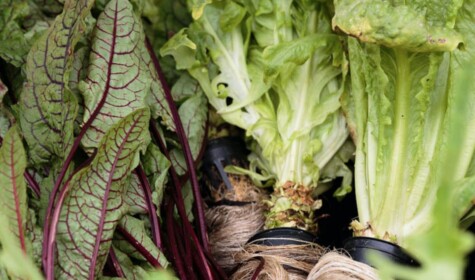Major change from industrial agriculture to regenerative agriculture involves a shift from monocultural (largely) grain crops towards a more diverse harvest with smaller volumes of different products, many of which are more perishable than grain, coming available at different times of the year. This makes long-distance distribution less feasible and farmers more reliant on the domestic market. It also requires purchasers to appreciate the seasonality of products and the fluctuations in supply, and respond with greater flexibility through their menus. The public sector is ideally positioned to support local farmers and public sector caterers can provide regular business, considerable spend and reliable payments. However, typically they are not seen as an easy route-to-market.
The response of many would-be suppliers, as well as the public in general, is to assume that price is a barrier to sourcing more locally within the public sector. While this can be the case, especially on certain products like lamb, more often than not the real barriers are the procurement frameworks themselves. These often make it impossible for local businesses to fulfil the requirements, so many never apply in the first place. The frameworks tend to demand consistent supply and reliable distribution to cover the whole annual requirement for a range of products over a potentially large area. Local small and medium enterprises (SMEs) may have excellent products and even be able to outbid national suppliers on price, but they are less likely to be able to support the volumes and distribution service required.
There is also a concern that building relationships with multiple local suppliers and manging the performance of a broader supply chain is time-consuming and requires additional overheads within procurement teams. This is one of the reasons that procurement frameworks have traditionally been grouped into such large contracts. But where there is a will, there is a way. Several passionate public sector caterers have been successful with local suppliers by taking a more flexible approach.
The Lancashire County Council has been working with the same local fruit and vegetable wholesaler since 1944. Over time the Council has expanded what they buy locally to include farm-assured meats, free range eggs and other dairy products, all the time working with their fruit and vegetable distributor who acts as a distribution hub. Recently they have tendered for a further expansion of their distribution hub contract to include frozen and grocery goods, which their fruit and vegetable distributor has won. A key factor in their success has been separating out the contracts for the produce from the distribution. This enables the Council to engage their fruit and vegetable distributor on the distribution of their choice of local producers managed through smaller supply-only lots. These are mini contracts that don’t require the full tender process due to their smaller size and also don’t require suppliers to distribute their products directly to all the schools within the local authority area. Instead, suppliers can deliver into a single hub instead of having to go directly to possibly more than a hundred different schools spread across the region. The result is that these contracts are much more accessible for local SMEs. The distribution contract also includes managing orders and payments across all suppliers from the lots, meaning that the Council has a single invoice to pay, a single point of contact and a single contract to performance manage. They have eliminated the dreaded bureaucracy of a broader supply chain, while still supporting the local economy.
In Scotland, Dumfries & Galloway are an example of a local authority that has taken on the distribution themselves, turning a building they own into a distribution hub and creating their own ‘naturally D&G’ brand to facilitate local sourcing. They specify that they need 24- hour delivery for fresh produce, which has led to sourcing all their bakery, cheese, yoghurt and eggs from within Dumfries & Galloway, while their meat comes from just across the border, 32 miles from the depot. According to Alan Mawson, Facilities Manager at Dumfries & Galloway ‘our distribution hub has had a major impact for our smaller suppliers, like Auchtralure Eggs, who otherwise wouldn’t have the resources to deliver to 116 schools.’
West Suffolk Hospital has a similar policy to ensure the freshness of certain produce: meat, dairy, bread and vegetables. For these contracts, the hospital only contacted local suppliers within Suffolk, Cambridgeshire and Norfolk that already had experience of trading with catering businesses and asked them to submit prices based on their catering usage (the volumes they order and how frequently they expect delivery). From these submissions they made a shortlist to send samples for blind tasting. As a result of their focus on fresh produce, they source 75% of food from suppliers within 30 miles of the hospital and have found that the quality of their food attracts visitors and staff to eat in the hospital, turning their catering into a revenue generator.
The University Caterers Organisation (TUCO) takes the pressure off individual university procurement teams by offering to manage contract frameworks for universities across the country. This also helps consolidate spend to negotiate better deals. Universities like Nottingham Trent might find local suppliers they want to work with and then recommend them to TUCO to ensure a compliant route-to-market. TUCO have taken pains to remove as many barriers as possible for SMEs to apply to their frameworks, creating smaller, regional opportunities and supporting SMEs financially by paying for them to acquire the necessary accreditations through their partnership with Net Positive Futures, an organisation set up specifically to provide advice and practical support to SMEs in demonstrating their sustainability.
Nottingham Trent University is an excellent example of how the public sector can create positive local change by sharing their demands for more local produce and working with suppliers to fulfil them. They worked with their distributor Millside-Barrowcliffe to procure more from local farms. Now Millside-Barrowcliffe’s clear local offering helps them win other local contracts and they supply more than 800 schools as well as several hospitals.
There is also considerable excitement about the role that new platform technology, an interface to connect multiple businesses together, can play in facilitating multiple local supplier relationships, co-ordinating distribution and supplier payments, and enabling collective fulfilment of contracts. This enables suppliers that would otherwise only have enough produce for a percentage of the contract, to fulfil that contract when they have produce available and let other suppliers from further afield or with harvests later in the season pick up orders when they can’t. A well-designed platform can alleviate the additional costs associated with managing a broader, more local supply chain by consolidating contracts and managing individual suppliers as subcontractors, while still providing direct contact and the ability to order with suppliers all in one place.
Simultaneously, using the technology to co-ordinate distribution locally, drastically reduces food miles. In a pilot with the Bath and North East Somerset Council, this model reduced food miles by 59%, saving 6.01 tons of CO2 emissions and a fuel cost of £7797 per year. These technologies have been termed ‘dynamic purchasing systems’ in that they facilitate a more coordinated and responsive procurement process that better reflects the active and immediate nature of the local food supply.
The ease of access to a global food supply chain has eroded our understanding of food as something that is dependent on the fluctuating forces of nature to come into fruition and led us to believe that we can demand whatever food we want when we want it. Purchasers often assume that if a product isn’t available locally, the only option is to buy it from elsewhere, but increasingly public sector caterers are realising the power of working with local suppliers to develop the products they know will appeal to and nutritionally benefit the local communities they serve, while also adapting their menus to suit what is available locally through agroecological farming practice.
Flexible frameworks, closer partnerships with local distributors and producers and dynamic purchasing systems are all steps in the right direction towards a future where our demand for food will be much better aligned with sustainable farming outputs and even able to foster continual improvement. With a little imagination and determination, public sector spend can overcome the bureaucratic barriers and be used as a force for good.






